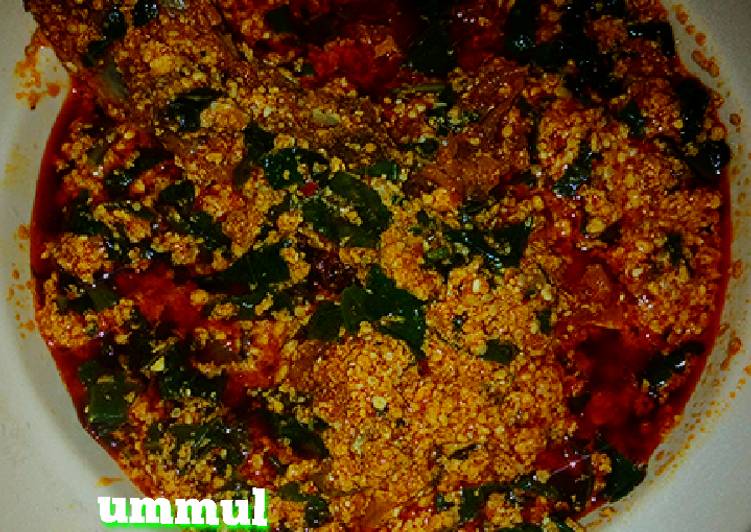Egusi soup. This soup is native to West Africa (Nigeria) and many of my American as well as Nigerian friends have enjoyed it. It is a great soup for those who like to try something different every once in a while. Ground Egusi seeds give this soup a unique color and flavor.
 It is known as Miyan Gushi in Hausa, Ofe Egusi in Igbo and Efo Elegusi in Yoruba.
Nigerian Egusi Soup (Caking Method) [Video] Egusi and Ogbono Soup Combo How to cook egusi soup in simple steps Add ground melon to a bowl, add about a cup of water and mix to form a paste then set aside.
Wash and chop the spinach, drain in a colander and set aside.
You can cook Egusi soup using 10 ingredients and 8 steps. Here is how you achieve that.
It is known as Miyan Gushi in Hausa, Ofe Egusi in Igbo and Efo Elegusi in Yoruba.
Nigerian Egusi Soup (Caking Method) [Video] Egusi and Ogbono Soup Combo How to cook egusi soup in simple steps Add ground melon to a bowl, add about a cup of water and mix to form a paste then set aside.
Wash and chop the spinach, drain in a colander and set aside.
You can cook Egusi soup using 10 ingredients and 8 steps. Here is how you achieve that.
Ingredients of Egusi soup
- You need of red pepper.
- Prepare of Sweet pepper.
- You need of Onion.
- You need of Granded egusi.
- Prepare of Red oil.
- You need leaf of Green.
- It's of Meat.
- Prepare of Crey fish.
- You need of Onga classic.
- You need of Maggi.
Ground egusi (or pumpkin seeds) is the main ingredient. Other ingredients include red palm oil, African crayfish, meats and fish, seasoning, hot pepper and some form of leafy greens. Nigerian Egusi Soup is made thick using ground melon seeds and leafy vegetables. It is one of the most popular soups prepared by many Nigerian tribes.
Egusi soup instructions
- Mix ur egusi with water..
- Put ur pot on heat and add ur red oil..
- Pour d mixed egusi in d hot oil and fry..
- Add ur blended sweet and red pepper stir and fry..
- Add ur boiled meat and it broth and cry fish.not much of d broth..
- Add ur maggi and onga classic..
- Cover to simmer for minute..
- Wash and cut ur leaf and add to d soup.remove from heat and allow d leaf to done..
The people eat it with dishes like Pounded Yam. You can prepare egusi soup with goat, beef, fish, or shellfish! Egusi soup is unarguably the most popular Nigerian soup. In my few years as a food blogger and Nigerian food lover, I have learned that different recipes exist across different Nigerian ethnic groups. The Yorubas make efo elegusi while the Igbos make ofe egusi, all with similar ingredients but with slightly different approaches.